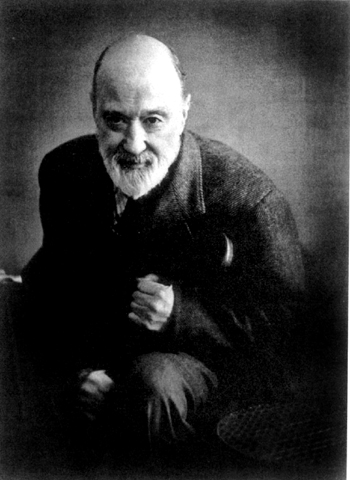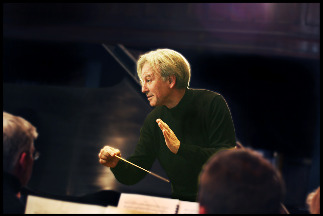The Ives Project: Beyond an innovator’s sound, to his spirit
By Stephen Brookes • The Washington Post • October 30, 2011
It was January 10, 1931, and the mood at New York’s Town Hall was turning ugly. Conductor Nicolas Slonimsky had just led the orchestra through “Three Places in New England” by the little-known composer Charles Ives, and had been met with jeers. Things got even rowdier when Slonimsky launched into Carl Ruggles’s dissonant “Men and Mountains,” and when a listener stood up and loudly began to boo, Ives — who had quietly endured the catcalls for his own work — jumped to his feet.
“Stop being such a God-damned sissy!” he shouted at the heckler. “Why can’t you stand up before fine strong music like this and use your ears like a man!” It was one of the more red-blooded moments in American music, and a classic gesture from Ives — a fiercely independent Connecticut Yankee who, though largely ignored in his lifetime, has come to be recognized as one of America’s most remarkable composers. In fact, he may be one of the most visionary — and strangely paradoxical — figures of the 20th century. A modernist who disliked the modern world, a self-made millionaire who championed the common man, Ives isolated himself from the musical world yet came up with virtually all of the innovations of 20th-century music — from wildly intricate rhythms to spacing musicians in different places in the concert hall— long before anyone else. And in the process, he wrote some of the most profound and quintessentially “American” music the world has ever heard.
It was one of the more red-blooded moments in American music, and a classic gesture from Ives — a fiercely independent Connecticut Yankee who, though largely ignored in his lifetime, has come to be recognized as one of America’s most remarkable composers. In fact, he may be one of the most visionary — and strangely paradoxical — figures of the 20th century. A modernist who disliked the modern world, a self-made millionaire who championed the common man, Ives isolated himself from the musical world yet came up with virtually all of the innovations of 20th-century music — from wildly intricate rhythms to spacing musicians in different places in the concert hall— long before anyone else. And in the process, he wrote some of the most profound and quintessentially “American” music the world has ever heard.
“Ives is a larger-than-life personality — a legendary figure, something out of a storybook,” says Joseph Horowitz, a founder of the PostClassical Ensemble. “And he’s indisputably a great spirit.”
Horowitz is the driving force behind the Ives Project, a three-day festival of concerts and discussions this week at the Music Center at Strathmore, that kicks off Thursday with a multimedia “theatrical concert” tracing the composer’s life through his own words and music. Horowitz’s PostClassical Ensemble will be joined by some of the top Ives interpreters in the country — including baritone William Sharp, the Jack Quartet and the rising piano superstar Jeremy Denk — to probe the roots of Ives’s still-controversial music.
“Ives is, in a sense, a very autobiographical composer,” says Denk. “He delves into the magic of things that come from his youth.”
Ives’s iconoclastic path through music began, in fact, almost as soon as he could reach the keyboard. Ives, born in 1874 in Danbury, Conn., was encouraged by his father — the town’s bandmaster — to develop an eclectic, open-minded approach to music. He learned to sing in one key while his father played the piano in another, and was was exposed to a wide range of vernacular music, from hymns and patriotic marches to the ballads of Stephen Foster.
But his father’s key lesson was to ignore the surface appeal of music and look into its deeper meaning. Listening to a stonemason croaking his way through a hymn, he told the boy: “Don’t pay too much attention to the sounds, for if you do, you may miss the music. You won’t get a wild, heroic ride to heaven on pretty little sounds.” Angel Gil-Ordonez will lead the PostClassical EnsembleThe advice stuck. Ives went on to study composition at Yale University but chafed at the convention-bound world of professional music and, after graduating, went into the insurance business instead. It was a crucial decision. Ives turned his back on the musical mainstream and — while building his own hugely successful insurance company — composed feverishly and in isolation for the next several decades, turning out four symphonies, more than a hundred songs, two piano sonatas and a host of other strikingly original works, few of which he ever heard performed.
Angel Gil-Ordonez will lead the PostClassical EnsembleThe advice stuck. Ives went on to study composition at Yale University but chafed at the convention-bound world of professional music and, after graduating, went into the insurance business instead. It was a crucial decision. Ives turned his back on the musical mainstream and — while building his own hugely successful insurance company — composed feverishly and in isolation for the next several decades, turning out four symphonies, more than a hundred songs, two piano sonatas and a host of other strikingly original works, few of which he ever heard performed.
“Ives didn’t have to care about making a living with his music,” says Angel Gil-Ordonez, the music director of the PostClassical Ensemble. “And that gave him the freedom and confidence to write what he felt.”
The result was music that married Ives’s American identity, populist philosophy and musical sophistication into music unlike anything else being written. He drew on the sounds of everyday New England life — popular songs and long-forgotten hymns crop up throughout his music — weaving them into exhilarating, wildly colorful tapestries of sound. Determined to free music from its hidebound conventions, he experimented constantly with polytonality, tone clusters, complex rhythms, collage effects, microtones and a raft of other new techniques long before they became part of the accepted language of modern music.
But Ives’s innovations, Horowitz says, pale beside the spiritual power of his music, which seems to embody the “heroic ride to heaven” his father had pointed him toward. A key work on Thursday’s program, for example, is strange and enigmatic “The Unanswered Question,” in which a trumpet repeatedly poses a five-note phrase described by Ives as “the eternal question of existence.”
“The thing that makes Ives’s music matter is its spiritual dimension — the notion that art is a noble enterprise,” Horowitz says. “It’s true that Ives was almost bewilderingly innovative, but if we use innovation as the most important criterion of his greatness, we diminish him. We’re making a different statement: that Ives was a great spirit and a great human being.”
•••••
The Ives Project
Ives Masterclass with Jeremy Denk
Thursday, November 3, 2011; 4 p.m.; Mansion at Strathmore
Admission: Free (tickets required)
Piano virtuoso Jeremy Denk will guide piano students in the intricacies of performing Ives’ music and mainstays of the American repertoire.
Ives Plays Ives
Thursday, November 3, 2011; 5:30 p.m.; Mansion at Strathmore
Admission: Free (tickets required)
Post-Classical Ensemble Artistic Director Joseph Horowitz and pianist Jeremy Denk present and discuss rare recordings of Ives performing his own music.
Charles Ives: A Life in Music
Jeremy Denk, piano; William Sharp, baritone; Carolyn Goelzer and Floyd King, actors;
Post-Classical Ensemble with Angel Gil-Ordóñez, conductor; written and directed by Joseph Horowitz
Thursday, November 3, 2011; 8 p.m.; Music Center at Strathmore
Tickets $15 - $25 (Stars Price $13.50–$22.50)
Charles Ives: The Unanswered Question
Charles Ives: In the Inn
Charles Ives: Largo Cantabile
Charles Ives: Over the Pavements
Charles Ives songs: ―The Circus Band, ―Memories, ―Feldeinsamkeit, ―Ich grolle nicht, ―Remembrance, ―The Housatonic at Stockbridge, ―General Booth Goes to Heaven, ―Thoreau, ―Down East, ―Cradle Song, ―At the River, ―Serenity, ―The Majority
This theatrical concert weaves music and readings from the composer’s essays and letters in a guided tour through this American original’s life and work—his passionate courtship, his fierce Transcendentalism and his cranky politics. An original script written by Joseph Horowitz helps to define the composer’s life through his relationships with close confidantes, peers and family. This event includes a post-concert discussion with artists and scholars. Performance features Jeremy Denk, piano; William Sharp, baritone; Floyd King and Carolyn Goelzer, actors; and Post-Classical Ensemble with conductor Angel Gil-Ordóñez.
Beethoven and Ives
Jeremy Denk, piano and William Sharp, baritone
Friday, November 4, 2011; 8 p.m.; Music Center at Strathmore
Tickets $15 - $45 (Stars Price $13.50-$40.50)
Charles Ives: Concord Sonata
Ludwig van Beethoven: Piano Sonata No. 29, ―Hammerklavier‖
The four movements of Ives’ landmark Concord Sonata are dedicated to iconic New England literary figures Ralph Waldo Emerson, Nathaniel Hawthorne, Henry David Thoreau and the Alcotts. This performance of the work incorporates readings by these great voices of American literature. In tribute to Ives’ lifelong admiration for Beethoven, the concert concludes with Beethoven’s ―Hammerklavier‖ Sonata. The performance features Jeremy Denk, piano and William Sharp, reader. Audience members can join a post-concert discussion with the artists.
Interpreting Ives
Saturday, November 5, 2011; 3:30 - 6:30 p.m.; Music Center at Strathmore, Room 402
Tickets $15 (Stars Price $13.50)
3:30-4:30 p.m.: Lecture/performance with Joseph Horowitz on Ives and the 21st Century; Jeremy Denk on Ives and Beethoven
4:30-5:15 p.m.: Reception and mingling with the artists
5:15-6:30 p.m.: Tom Owens on Ives’ letters; William Sharp performs and discusses the parlor sources of Ives’ songs
In this intimate immersion experience, definitive Ives authorities Joseph Horowitz, Jeremy Denk, Tom Owens and William Sharp build an understanding and image of the celebrated composer by exploring his relevance in the 21st century and relationship to revolutionary musical predecessors.
Ives and Other Innovators -- The Jack Quartet
Saturday, November 5, 2011; 7:30 p.m.; Mansion at Strathmore
Tickets $30 (Stars Price $27)
Philip Glass: String Quartet No. 5
Julia Wolfe: Dig Deep 7
Charles Ives: String Quartet No. 2
Caleb Burhans: Contritus


Reader Comments